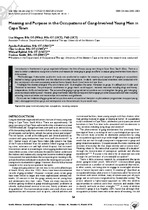Meaning and purpose in the occupations of gang-involved young men in Cape Town
Date
2016Author
Wegner, Lisa
Behardien, Ayesha
Loubser, Cleo
Ryklief, Widaad
Smith, Desiree
Metadata
Show full item recordAbstract
INTRODUCTION: Involvement in gangs negatively influences the lives of many young men living in Cape Town, South Africa. There is a
need to better understand young men's motives and reasons for belonging to gangs as efforts to reduce gang involvement have shown
little success.
METHODOLOGY: A descriptive qualitative study was conducted to explore the meaning and purpose of engaging in occupations
related to being a gang member, and the influence on other occupations. In-depth, semi-structured interviews were conducted with
four participants who were purposively selected from a Special Youth Care Centre in Cape Town.
FINDINGS: Five themes emerged: Why am I where I am?; To strengthen the camp; Attraction to gangs; It's difficult but it's life; and
Threshold to manhood. The participants' involvement in gangs meant social support, material resources including drugs and money,
independence, thrills and excitement. The purpose of engaging in gang-related occupations was to strengthen the gang, gain belonging,
prove manhood and for survival. However, gang-involvement deprived participants from engaging in other occupations and roles including
schooling, leisure activities and relationships with mothers and girlfriends.
CONCLUSIONS: Understanding gang-related occupations assists occupational therapists to plan relevant programmes to support young
men's disengagement from gangs and reintegration into the community in pro-social ways.

